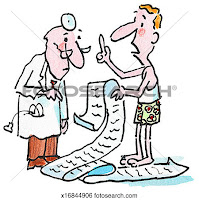When I got home after the debut conference on Narrative Medicine at Kripalu Center for Yoga and Health last summer, I couldn’t wait to share my enthusiasm with my husband. He is a dedicated family physician who also struggles to keep patient care a priority while coping with the initiatives and mandates imposed by an aggressive and mercenary hospital health system.
I suggested that our colleagues might be interested
in learning about it.
His response?
“That will never happen.”
And, for a couple of reasons, I’m afraid he was right. It takes time to listen to the patient’s story (a.k.a. his medical history). It slows you down. At the end of the day, you won’t have seen as many patients, and therefore, you won’t have generated as much income. Short of anecdotal reports, there is insufficient proof (data) to suggest that exploring the patient’s narrative improves patient outcomes or conserves resources. The system is fueled by competition for power and control rather than compassion and connection.
My husband’s skepticism led me to ask again, “What would it take to change the system as it is evolving?”
This led me back to an important storytelling technique. If you have a story to tell but you’re not sure how to develop it, an excellent tool is to begin with the question: “What if…?” or, “What would happen if…?”.
 |
| www.tarangsinha.blogspot.com |
What would it take to convince a CEO, CFO or healthcare policy maker to understand that the present system is failing both patients and providers? Well…
·
…what if his father died of pneumonia three
weeks following early discharge from the hospital based on a predetermined protocol
that failed to take into consideration the fact his father didn’t have the
strength to generate an effective cough?
·
…what if his son died of a heroin overdose
when he’d denied drug or alcohol abuse at his sports physical just a week
earlier?
·
…what if he had to see his own physician because
of a laceration he sustained slicing his bagel for breakfast, and then missed a
critical meeting with the architect regarding plans for an expansion because no
one in the practice had time to fit him in?
Before they concede the need for
change, perhaps the system would have to fail the very people who conceived it,
promote it and continue to defend it despite its inherent shortcomings. Perhaps
then, ambition would bow to compassion.
“It can be argued that the largest yet most neglected
health care resource, worldwide, is
the patient…”
~Dr. Danny Sands~
In my next post, I’ll explain what this has to do with my decision to retire prematurely…
jan













